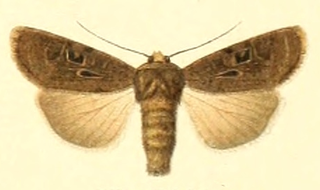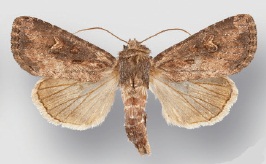
Chytolita is a monotypic litter moth genus of the family Erebidae erected by Augustus Radcliffe Grote in 1873. Its only species, Chytolita morbidalis, the morbid owlet moth or morbid owlet, was first described by Achille Guenée in 1854. It is found in large parts of North America, from coast to coast in the north and south to North Carolina, Texas and Florida in the west. The habitat consists of deciduous woods and edges.

Tripudia is a genus of moths of the family Noctuidae. The genus was erected by Augustus Radcliffe Grote in 1877.

Syngrapha rectangula, the salt and pepper looper or angulated cutworm, is a moth of the family Noctuidae. The species was first described by William Kirby in 1837. It is found in North America from Newfoundland, Quebec, northern Ontario to Manitoba, New Jersey, northern Pennsylvania, southern Michigan, northern Wisconsin, North Carolina, Virginia, British Columbia, Alberta, Montana, northern Idaho and the Cascades.

Chersotis andereggii is a moth of the family Noctuidae.

Resapamea passer, the dock rustic moth, is a moth in the family Noctuidae. It is found from central Alberta to northern Arizona in the Rocky Mountain region. In the mid-Continent it ranges from Minnesota and southern Ontario to Oklahoma and North Carolina, reaching the Atlantic Coast from Newfoundland to Maryland. The habitat consists of wetlands.
Tripudia paraplesia is a moth in the family Noctuidae first described by Michael G. Pogue in 2009. It is found in north-eastern Mexico. A single specimen was collected in the US state of Louisiana in 1994.
Epiglaea apiata, the pointed sallow moth or cranberry blossom worm, is a moth of the family Noctuidae. It is found in North America, where it has been recorded from Florida, Georgia, Indiana, Louisiana, Maine, Maryland, Michigan, Minnesota, New Brunswick, North Carolina, Ohio, Quebec, South Carolina and Wisconsin.

Chersotis rectangula is a moth of the family Noctuidae. It is the type species of the genus Chersotis.

Metalectra quadrisignata, the four-spotted fungus moth, is a species of moth in the family Erebidae. It is found in North America, where it has been recorded from Arizona, Florida, Georgia, Indiana, Iowa, Kentucky, Louisiana, Maine, Maryland, Massachusetts, Michigan, New Brunswick, New Hampshire, New Jersey, North Carolina, Ohio, Oklahoma, Pennsylvania, Quebec, South Carolina, Tennessee, Texas, Virginia, West Virginia and Wisconsin. The species was described by Francis Walker in 1858.
Tripudia chihuahua is a species of moth in the family Noctuidae. It is found in North America.
Tripudia versutus is a species of moth in the family Noctuidae. It is found in North America.

Tripudia quadrifera is a species of moth in the family Noctuidae.
Tripudia munna is a species of moth in the family Noctuidae.

Tripudia flavofasciata is a species of moth in the family Noctuidae. It is found in North America.
Tripudia damozela is a species of moth in the family Noctuidae. It was first described by Harrison Gray Dyar Jr. in 1914 and it is found in Central and North America.
Tripudia limbatus is a species of moth in the family Noctuidae.
Tripudia grapholithoides is a species of moth in the family Noctuidae. It is found in the Caribbean Sea, North America, and South America.
Tripudia luda is a species of moth in the family Noctuidae.

Tripudia luxuriosa is a moth in the family Noctuidae first described by Smith in 1900. It is found in North America.
Tripudia goyanensis is a species of moth in the family Noctuidae.










